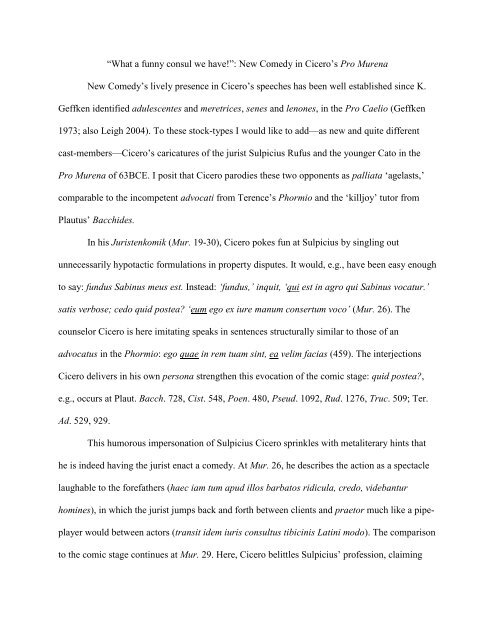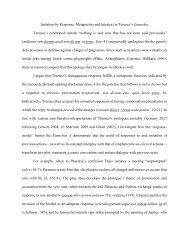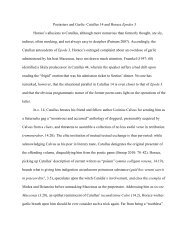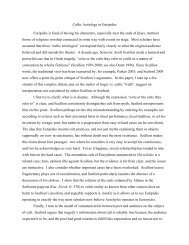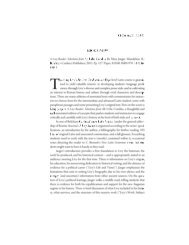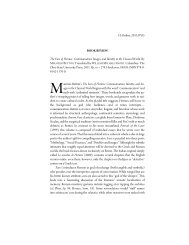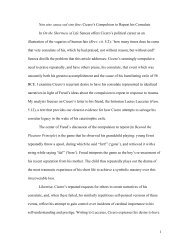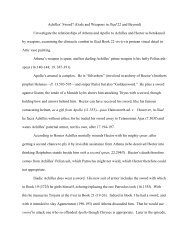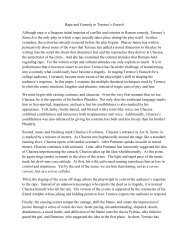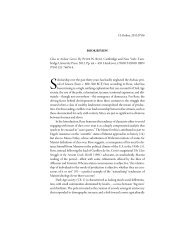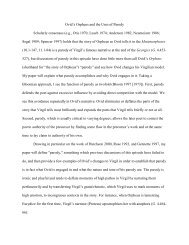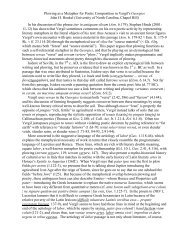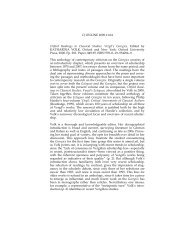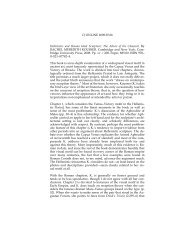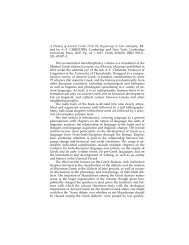“What a funny consul we have!”: New Comedy in Cicero's Pro ...
“What a funny consul we have!”: New Comedy in Cicero's Pro ...
“What a funny consul we have!”: New Comedy in Cicero's Pro ...
You also want an ePaper? Increase the reach of your titles
YUMPU automatically turns print PDFs into web optimized ePapers that Google loves.
<strong>“What</strong> a <strong>funny</strong> <strong>consul</strong> <strong>we</strong> <strong>have</strong>!<strong>”</strong>: <strong>New</strong> <strong>Comedy</strong> <strong>in</strong> Cicero’s <strong>Pro</strong> Murena<br />
<strong>New</strong> <strong>Comedy</strong>’s lively presence <strong>in</strong> Cicero’s speeches has been <strong>we</strong>ll established s<strong>in</strong>ce K.<br />
Geffken identified adulescentes and meretrices, senes and lenones, <strong>in</strong> the <strong>Pro</strong> Caelio (Geffken<br />
1973; also Leigh 2004). To these stock-types I would like to add—as new and quite different<br />
cast-members—Cicero’s caricatures of the jurist Sulpicius Rufus and the younger Cato <strong>in</strong> the<br />
<strong>Pro</strong> Murena of 63BCE. I posit that Cicero parodies these two opponents as palliata ‘agelasts,’<br />
comparable to the <strong>in</strong>competent advocati from Terence’s Phormio and the ‘killjoy’ tutor from<br />
Plautus’ Bacchides.<br />
In his Juristenkomik (Mur. 19-30), Cicero pokes fun at Sulpicius by s<strong>in</strong>gl<strong>in</strong>g out<br />
unnecessarily hypotactic formulations <strong>in</strong> property disputes. It would, e.g., <strong>have</strong> been easy enough<br />
to say: fundus Sab<strong>in</strong>us meus est. Instead: ‘fundus,’ <strong>in</strong>quit, ‘qui est <strong>in</strong> agro qui Sab<strong>in</strong>us vocatur.’<br />
satis verbose; cedo quid postea? ‘eum ego ex iure manum consertum voco’ (Mur. 26). The<br />
counselor Cicero is here imitat<strong>in</strong>g speaks <strong>in</strong> sentences structurally similar to those of an<br />
advocatus <strong>in</strong> the Phormio: ego quae <strong>in</strong> rem tuam s<strong>in</strong>t, ea velim facias (459). The <strong>in</strong>terjections<br />
Cicero delivers <strong>in</strong> his own persona strengthen this evocation of the comic stage: quid postea?,<br />
e.g., occurs at Plaut. Bacch. 728, Cist. 548, Poen. 480, Pseud. 1092, Rud. 1276, Truc. 509; Ter.<br />
Ad. 529, 929.<br />
This humorous impersonation of Sulpicius Cicero spr<strong>in</strong>kles with metaliterary h<strong>in</strong>ts that<br />
he is <strong>in</strong>deed hav<strong>in</strong>g the jurist enact a comedy. At Mur. 26, he describes the action as a spectacle<br />
laughable to the forefathers (haec iam tum apud illos barbatos ridicula, credo, videbantur<br />
hom<strong>in</strong>es), <strong>in</strong> which the jurist jumps back and forth bet<strong>we</strong>en clients and praetor much like a pipe-<br />
player would bet<strong>we</strong>en actors (transit idem iuris <strong>consul</strong>tus tibic<strong>in</strong>is Lat<strong>in</strong>i modo). The comparison<br />
to the comic stage cont<strong>in</strong>ues at Mur. 29. Here, Cicero belittles Sulpicius’ profession, claim<strong>in</strong>g
that only those who fail at oratory turn <strong>in</strong>to scholars of the law; similarly, those who do not<br />
succeed as citharodes turn <strong>in</strong>to aulodes (eos auloedos esse, qui citharoedi fieri non potuer<strong>in</strong>t).<br />
The aulos-flute was associated with drama and often considered beneath the cithara that<br />
accompanied loftier compositions (Bürge 1974 ad loc.; Hall 2002). Cicero is thus not merely<br />
cit<strong>in</strong>g a proverb, but also clarify<strong>in</strong>g that he considers his opponent’s ‘comedy’ not altogether<br />
despicable, but ultimately <strong>in</strong>ferior to the ‘lyric’ poetry of his own oratory. Both of these<br />
occupations <strong>in</strong> turn <strong>have</strong> to yield to Murena’s martial accomplishments, which Cicero also<br />
compares to a literary genre. This time, he turns to epic poetry (30), quot<strong>in</strong>g from Ennius’<br />
Annales (247-253 Skutsch) to conclude that <strong>in</strong> times of military crisis, ‘bonus, horridus miles<br />
amatur.’ vestrum vero studium totum iacet.<br />
Correspond<strong>in</strong>gly, Cicero’s parody of Cato, aga<strong>in</strong> delivered <strong>in</strong> character, recalls a Plaut<strong>in</strong>e<br />
magister. In the Bacchides, Lydus objects to his student’s presence at a d<strong>in</strong>ner party (109-26);<br />
Cato criticizes Murena for enterta<strong>in</strong><strong>in</strong>g voters at banquets (72). The spoilsport tutor then counters<br />
the young man’s every objection with clever literary references (e.g., to Hom. Il. 2.489 at Bacch.<br />
128: qui si decem habeas l<strong>in</strong>guas, mutum esse addecet), just as Cato is described as foil<strong>in</strong>g<br />
criticisms with commonplaces about Stoic sages (e.g.: ‘iratus dixisti!’ ‘numquam,’ <strong>in</strong>quit,<br />
‘sapiens irascitur,’ 62). In the end, both Cato and the tutor may w<strong>in</strong> the battle of wits, but the<br />
adulescens simply silences Lydus (Bacch. 169: sequere hac me ac tace) and Cicero dismisses<br />
vestri virtutis magistri (!) as tak<strong>in</strong>g their precepts too seriously (Mur. 65). Still, the listeners must<br />
<strong>have</strong> laughed with Cato more than at him; after all, Cicero acknowledges Cato’s ‘Plaut<strong>in</strong>e’<br />
smarts even as he repels his strictures.<br />
This gentle, <strong>New</strong> <strong>Comedy</strong>-based ridicule allows Cicero to succeed <strong>in</strong> his defense while<br />
leav<strong>in</strong>g his opponents—potential allies <strong>in</strong> the ongo<strong>in</strong>g struggle aga<strong>in</strong>st Catil<strong>in</strong>e—not altogether
alienated. That this is the purpose of his references to <strong>New</strong> <strong>Comedy</strong> can be surmised from the De<br />
oratore, which recommends cavillatio for situations where an adversary’s feel<strong>in</strong>gs <strong>have</strong> to be<br />
spared (parcebat enim adversarii dignitati, 2.221); one relevant subcategory is ‘parodistic<br />
imitation,’ imitatio depravata (2.242), an example of which is provided from a palliata play. It<br />
seems that this strategy is at play <strong>in</strong> the <strong>Pro</strong> Murena (compare Qu<strong>in</strong>t. 11.1.68-72), which may be<br />
why Plutarch referred to Cicero’s technique <strong>in</strong> this speech as κωμῳδεῖν and Cato himself<br />
commented wryly: <strong>“What</strong> a <strong>funny</strong> <strong>consul</strong> <strong>we</strong> <strong>have</strong>!<strong>”</strong> (Plut. Comp. Dem. Cic. 1.5-6, Cat. M<strong>in</strong>.<br />
21.9).<br />
Works Cited<br />
Bürge, A. 1974. Die Juristenkomik <strong>in</strong> Ciceros Rede <strong>Pro</strong> Murena. Zürich: Juris.<br />
Leigh, M. 2004. “The <strong>Pro</strong> Caelio and <strong>Comedy</strong>.<strong>”</strong> CP 99.4: 300-335.<br />
Geffcken, K. A. 1973. <strong>Comedy</strong> <strong>in</strong> the <strong>Pro</strong> Caelio. Leiden: Brill.<br />
Hall, E. 2002. “The S<strong>in</strong>g<strong>in</strong>g Actors of Antiquity.<strong>”</strong> In: P. Easterl<strong>in</strong>g and E. Hall, eds. Greek and<br />
Roman Actors: Aspects of an Ancient <strong>Pro</strong>fession. Cambridge: CUP. 3-38.


